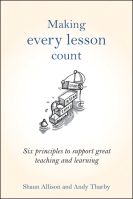 The 15 minute forum tonight was led by science teacher and Company Leader Steph Holt. Whilst we have discussed previously how students should best revise at home (here), Steph was focusing on what she does with her students in lessons, to help them prepare for their exams. Steph stressed that what she had to say wasn’t necessarily backed up by educational research but worked for her – and there’s a great deal to be said for combining evidence with wisdom.
The 15 minute forum tonight was led by science teacher and Company Leader Steph Holt. Whilst we have discussed previously how students should best revise at home (here), Steph was focusing on what she does with her students in lessons, to help them prepare for their exams. Steph stressed that what she had to say wasn’t necessarily backed up by educational research but worked for her – and there’s a great deal to be said for combining evidence with wisdom.
This is what Steph suggested:
Think like a teacher
Encourage students to scrutinise exam papers and know them inside out. Get them used to asking questions like:
- What has the exam board asked in previous exam questions regarding this topic?
- What else could they ask?
- Get students to predict the question based on the introductory information that goes before the question.
This will help to build their confidence and familiarity with the paper.
Practise under timed conditions
- Not just during a mock exam but any question given in class- give them timing guidelines. This is especially important for students that might be struggling – they have to get used to answering questions within a certain time frame.
- Before starting a mock get them to flick through and spot where the long mark questions are and then get them to give themselves timing guidelines – at what time should they be at the long question, if they’re going to have enough time to answer it effectively?
- Keep reminding them of these guidelines throughout their mock exams.
- Make more use of walking- talking mocks – to help them understand what the questions are asking. More on this here.
The Power of Speech
Students constantly write things down, however committing things to memory seems to be supported by encouraging them to talk about key concepts and articulating their ideas. Do this by:
- Getting them to repeat key words out loud.
- If it’s a word they struggle with constantly ask that person the same question throughout the lesson, to reinforce the terminology – the power of repetition.
- Get them to quiz themselves. Set the questions for them first though. (still keep the control).
- Insist that they use correct, subject-specific academic language – if it becomes normal to say it, they are more likely to write it.
The power of quizzes
Regular quizzes are great for recall and repetition, but it’s quite common for teachers to ask students to make their own quizzes and quiz each other. Whilst this might have a purpose, it’s probably more effective to make these up yourself – because you know the key bits of knowledge that they need to be able to recall. So you can shape the questions around this knowledge.
Share the specification
At this stage in Y11, it’s really important that students know, for each subject, what they have got to cover in their revision – so give them a list of topics from the specification, like this one from science:
This helps them to focus in on which topics to spend more time on revising (the ones they struggled with the most). It also allows them to keep a record of the topics they have covered. Doing this helps to reduce their anxiety – it makes the revision seems achievable, especially if it is a concise version of the specification.
Break it down
When teaching revision lessons try and think of ways to summarise content so it’s easy to remember. Once they remember these ‘triggers’ they can then start to add the detail. In science this is often best done by summarising information as a table:
 In history, Jack Tyler is developing this idea, by breaking each major topic down into 5 trigger words that are easy for students to remember. In geography they do this by summarising each case study as a diagram. The important point here, is that there is no one technique that will work for every subject. You need to find one that works for your subject.
In history, Jack Tyler is developing this idea, by breaking each major topic down into 5 trigger words that are easy for students to remember. In geography they do this by summarising each case study as a diagram. The important point here, is that there is no one technique that will work for every subject. You need to find one that works for your subject.
Use exam papers
- Make sure you know your stuff! Know your exam papers inside out. If you can’t get 100% on the paper find out why!
- As a department, sit down and work through some exam papers. Find the bits that students might struggle with and discuss the best ways of teaching these topics.
- Make use of exam paper booklets that they do in class during the run up to exams.
- BUT– always make sure they have the mark scheme available, whether projected on the board or given to them- (remember think like a teacher).
- Don’t just expect them to understand the mark scheme though – talk it through with them.
- Use key content PowerPoints that show the key ideas for each topic and what is needed in order to maximise marks on the questions.
- Support their metacognitive processes – show them what they should be thinking as they work through the papers. This blog from John Tomsett is a great example of this.
Mind Maps
Mind maps can be great for linking ideas and summarising a lot of information in one place, but students aren’t usually very good at doing them – and they often spend too much time colouring them in! So rather than waste time getting them to draw ones that aren’t very good, prepare one for them and talk it through with them:
Unpick the links together and point out easy ways to remember certain things e.g. with the flame test, Sodium starts with S, so does ‘sun’ and the sun is yellow. Then, get them to use the mind map as a prompt when answering long answer questions.
Keep checking
It is so easy to be a little more relaxed during revision lessons. Chalk and talk lessons and practising questions together is great but don’t forget to assess/check what they know and if they are able to use this to respond to questions, without your support – and not just in that lesson, but then also in the next lesson. That’s the only way you’ll know if they’ve really learnt it. They should be moving towards working through questions with a greater degree of independence. Mini-whiteboards can be a great way to do this – answer this question; look at/discuss answers; wipe it out and do it again….but better! This is also ‘low stakes’ – which is good!
And finally…
Remember, revision takes time. So it’s really important to plan in advance and leave as much time as possible for revision. Then repeat, repeat and repeat!
Links – The Finishing Line – from 2013














Pingback: Revision Strategies from Class Teaching | The Burgate Blog
Reblogged this on The Echo Chamber.
Reblogged this on petersugden.
Great stuff. Thanks for sharing.